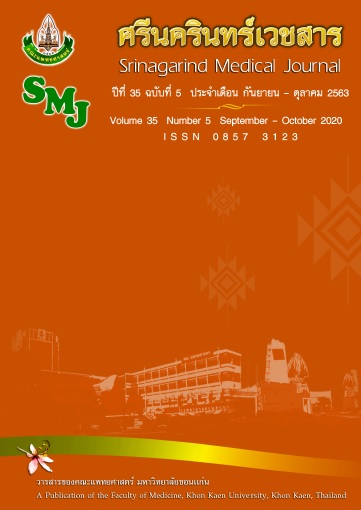Depression and Medication Adherence in Continuous Ambulatory Peritoneal Dialysis Patients
Keywords:
depression; medication adherence; continuous ambulatory peritoneal dialysis patientsAbstract
Background and Objectives: The number of continuous ambulatory peritoneal dialysis (CAPD) patients had been trending upwards every year. Meanwhile, many people were suffering from depression. This study was conducted to observe the prevalence of depression and to analyze the relationship between depression and medication adherence among CAPD patients.
Methods: This cross-sectional descriptive study was performed in 115 CAPD patients at HRH Princess Maha Chakri Sirindhorn medical center.
Results: The prevalence of depression was 40%. The factors affecting depression were education level, duration (years) of having chronic kidney disease, duration (years) of undergoing CAPD and serum albumin level. There was a relationship between depression and medication adherence in CAPD patients (p = 0.034). Those patients with depression had lower level of medication adherence than those without depression. Moreover, depression tended to be associated with those who undergoing CAPD for the first 5 years.
Conclusion: Forty percent of CAPD patients at HRH Princess Maha Chakri Sirindhorn medical center had depression. Depression was associated with lower medication adherence. Therefore, the screening for depression should be considered in patients undergoing CAPD particularly in the first 5 years.
References
2. Bautovich A, Katz I, Smith M, Loo C, Harvey S. Depression and chronic kidney disease: a review for clinicians. Aust N Z J Psychiatry 2014; 48(6): 530-541.
3. Ministry of Public Health. Prevention and improvement of depression. World health day 2017: depression…..let’s talk [Internet]. 2017 [cited 13 Dec 2017]. Available from: http://www.thaidepression.com/.
4. Shirazian S, Grant C, Aina O, Mattana J, Khorassani F, Ricardo A. depression in chronic kidney disease and end-stage renal disease: similarities and differences in diagnosis, epidemiology, and management. Kidney Int 2017; 2(1): 94-107.
5. Rosenthal D, Jindal R, Brown C, Kimmel P. Depression is an important contributor to low medication adherence in hemodialyzed patients and transplant recipients. Kidney Int 2019: 75(11): 1223-1229.
6. Puanglai K, Jarupaktranonth C, Changsirikulchai S, Janma J, Chuemongkon W. Stress and medication adherence among continuous ambulatory peritoneal dialysis patients. Srinagarind Med J 2020; 35(3) : 287-295.
7. Beck AT, Ward CH, Mendelson M. An inventory for measuring depression. Arch Gen Psychiatry 1961; 4(6): 561-571.
8. Satra K. Depression in old age: the study of the old age from Home of the Age Banthamapagon, Nakornratchasima province. Bangkok: Mahidol University; 1988.
9. Palmer S, Vecchio M, Craig JC, Tonelli M, Johnson DW, Nicolucci A, et al. Prevalence of depression in chronic kidney disease: systematic review and meta-analysis of observational studies. Kidney Int 2013; 84: 179–191.
10. Noree S, Bowolthumpiti A, Nochaiwong S, Koyratkoson K, Chaisai C, Panyathong S, et al. Prevalence and the correlation between depression and health related quality of life among hemodialysis and peritoneal dialysis patients. Songkla Med J 2017; 35(4): 301-312.
11. Thokaew S. Depression in hemodialysis patients in Nakhon Pathom province [Master of Science in Mental Health]. Bangkok: Chulalongkorn University; 2003.
12. Sinnakirouchenan R, Holley JL. Peritoneal dialysis versus hemodialysis: risks, benefits, and access issues. Adv Chronic Kidney Dis 2011; 18(6): 428-432.
13. Kübler-Ross E, Kessler D. On grief and grieving: finding the meaning of grief through the five stages of loss. New York: Scribner; 2014.
14. Sumneangsanor T. Coping with loss and grief. Thai Sci Technol J 2013; 21(7): 658-6067.
15. Kutner NG, Zhang R, McClellan WM, Cole SA. Psychosocial predictors of non-compliance in haemodialysis and peritoneal dialysis patients. Nephrol Dial Transpl 2002; 17: 93-99.
16. Kasantikul D. Major affective disorders. In: Tantiphlachiva K, editor. Textbook of psychiatry, The Psychiatric Association of Thailand. Bangkok: Thammasat Printing house; 1993: 384-410.
17. Ruangtrakul S. Psychiatric manual. Bangkok: Aksornsampan press; 1990: 92-99.




